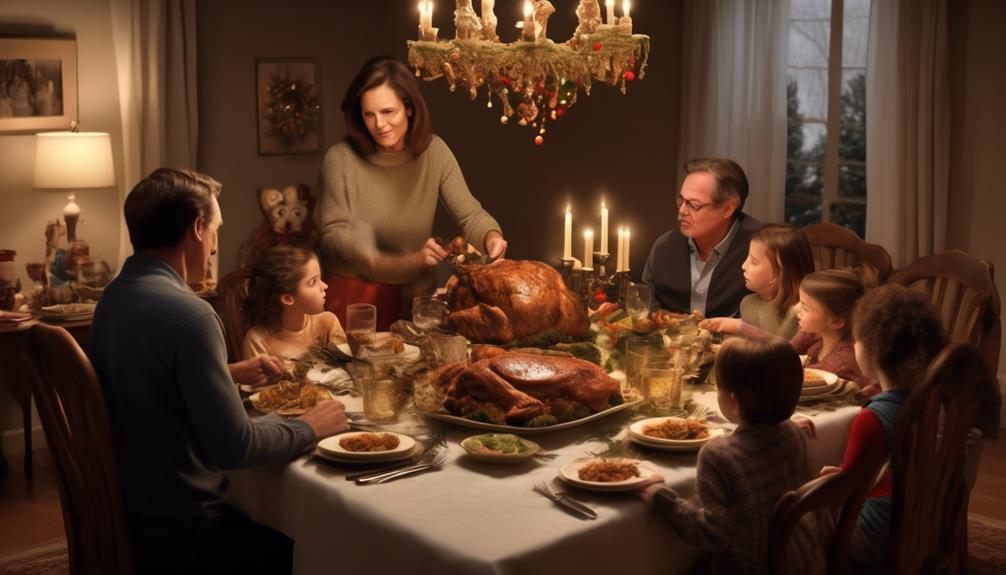As we near the holiday season, the air is filled with anticipation and warmth, like a comforting embrace after a long day.
However, beneath the surface of joy and celebration, there exists a shadow that looms over some relationships, casting a sense of unease and tension.
When navigating this time of year, it's crucial to be aware of the intricate dynamics at play, especially when dealing with individuals who may not always have our best interests at heart.
The holidays can be a time of vulnerability for many, and understanding the behaviors of covert narcissists during this period is essential for safeguarding our well-being and relationships.
Key Takeaways
- Covert narcissists use subtle manipulation tactics to control holiday gatherings.
- Relationships and family dynamics suffer due to the narcissist's behavior.
- Strategies for navigating holiday challenges include setting boundaries and prioritizing self-care.
- Recognize signs of covert narcissism, such as taking credit for others' accomplishments.
Behaviors of Covert Narcissists During Holidays
During holidays, covert narcissists often display subtle but destructive behaviors that manipulate and control those around them without raising suspicion among others. These individuals excel at stealing attention away from others, often making themselves the center of every gathering. They may start an argument to shift the focus onto themselves, only to grab it back with manipulative tactics that leave their victims feeling drained and confused.
Criticizing and controlling their victims behind closed doors, covert narcissists maintain a facade of reverence and respectability in public settings, making it challenging for outsiders to recognize their harmful behaviors. Gift-giving becomes a tool for manipulation, with presents often carrying hidden strings that serve to benefit the narcissist rather than the recipient.
Impact on Relationships and Family Dynamics

Frequently, covert narcissists insidiously disrupt the fabric of relationships and family dynamics, fostering toxicity and dysfunction through manipulation and control. This behavior is particularly evident during the holiday season when the focus is often on spending quality time with family and loved ones. The covert narcissist's constant need for attention and admiration can overshadow the needs and happiness of others in the family, creating a toxic family environment. They manipulate and control their family members, leading to feelings of confusion, insecurity, and low self-esteem among their loved ones.
| Impact on Relationships | Impact on Family Dynamics |
|---|---|
| Breakdown of trust, communication, and intimacy | Isolation from support networks |
| Feelings of confusion and low self-esteem | Strained relationships with family and friends |
| Overshadowing of family members' needs and happiness | Manipulation and control leading to dysfunction |
Strategies for Navigating Holiday Challenges
Navigating holiday challenges with a covert narcissist requires strategic planning and proactive measures to safeguard one's emotional well-being and maintain healthy boundaries.
When dealing with narcissists who often seek to be the center of attention, it's crucial to prioritize Mental Health and protect oneself during the festive season.
To ensure a wonderful Christmas despite the challenges posed by the covert narcissist, consider the following strategies:
- Set clear boundaries: Communicate expectations early to minimize manipulation.
- Seek support: Lean on trusted individuals who understand narcissistic behavior for validation.
- Focus on self-care: Prioritize your well-being to guard against emotional manipulation.
- Limit contact: Creating distance can reduce their negative impact on your mental health.
- Consider professional help: Counseling can equip you with coping skills to navigate interactions with the covert narcissist, especially during gatherings like Christmas Eve.
Maintaining Grace and Self-Care

Emphasizing self-care and maintaining grace when dealing with a covert narcissist during the holiday season is crucial for safeguarding our emotional well-being and setting healthy boundaries. Individuals with Narcissistic Personality Disorder often exhibit behavior that can be challenging, leaving us with a hard time navigating interactions with them, especially during family gatherings or festive occasions.
It's essential to prioritize our own well-being by recognizing when we need to step back and protect ourselves from potential emotional harm. Instead of engaging in arguments or confrontations with the covert narcissist, we should focus on setting boundaries and seeking support from trusted friends or professionals who understand the dynamics of dealing with such individuals.
While they may try to manipulate situations or relationships through lavish gifts or grand gestures, maintaining our sense of self-worth and joy is paramount. Remember, their behavior is a reflection of their own issues, not a reflection of our worth or happiness.
Recognizing Signs of Covert Narcissism
Recognizing signs of covert narcissism involves keen observation and understanding subtle manipulative behaviors that may go unnoticed by others. Covert narcissists often use tactics that cloak their true intentions, making it challenging to identify their harmful actions.
Here are five key indicators to help recognize covert narcissism:
- Covert narcissists often take credit for the accomplishments of others, presenting themselves as superior.
- Their behavior may appear charming and respectable to outsiders, while behind closed doors, they demean and devalue those closest to them.
- Unlike overt narcissists who boast openly, covert narcissists subtly manipulate situations to maintain control and power.
- Victims of covert narcissists may experience a constant questioning of their reality, leading to low self-esteem and psychological distress.
- Recognizing the destructive patterns of a covert narcissist can be a slow process, sometimes taking years to fully understand the extent of their manipulative behavior.
Understanding these signs can help individuals protect themselves from the detrimental effects of covert narcissism year after year.
Frequently Asked Questions
How Do Narcissists Behave on Holidays?
Narcissists can behave in manipulative ways during holidays. They may seek attention, control, or validation through various tactics. From criticism to sabotage, their actions often revolve around satisfying their own needs and maintaining power dynamics.
Gift-giving might come with hidden agendas or be used as a tool for punishment. These behaviors can create stress and drama during special occasions, affecting the overall atmosphere and enjoyment for everyone involved.
What Hurts a Covert Narcissist the Most?
When a covert narcissist faces being ignored or criticized, their fragile ego suffers deeply. The feeling of not being the center of attention can also be a significant blow to their sense of self.
Additionally, reminders of their inadequacies or exposure of their true manipulative nature can be profoundly hurtful. These experiences can trigger intense emotional reactions and lead to significant distress for a covert narcissist.
Why Narcissists Sabotage Holidays?
When narcissists sabotage holidays, it often stems from their need to control situations and manipulate those around them for personal gain. This behavior can be a way for them to assert power and attention, feeding their ego and sense of superiority.
What Upsets Covert Narcissist?
We often find that what upsets covert narcissists stems from their deep-seated insecurities and fear of vulnerability. Their need for control and validation can lead to extreme reactions when they feel threatened or exposed. Understanding these underlying motivations can provide insight into their behaviors and help navigate interactions with them more effectively.
Conclusion
As we navigate the holiday season with covert narcissists, let's remember that we're the architects of our own happiness.
Like a phoenix rising from the ashes, we can break free from the chains of manipulation and reclaim our independence and joy.
By recognizing the signs, seeking support, and practicing self-care, we can emerge stronger and more resilient, ready to embrace the holidays with grace and inner peace.











